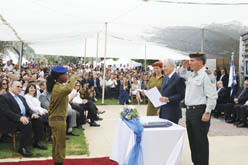 There were several American-born soldiers among the 120 outstanding ones honored on Independence Day Wednesday.
There were several American-born soldiers among the 120 outstanding ones honored on Independence Day Wednesday.
Among them were Chiyya Smason, a crew commander in the IDF’s artillery corps, and Gali Levy, a sergeant and paramedic in the Karakal combat unit, stationed on the Egyptian border.
Both are 21, with Smason hailing from St. Louis and Levy from New York.
Smason came here three-and-a-half years ago because it was always his dream to live here and be a soldier.
“I felt a connection, and I wanted to protect the country. Being in the army is the best way to do it,” he said.
Smason served in Operation Cast Lead in Gaza, and like some of the other soldiers, left a new, young bride behind. He and his wife Chagit were married in December. Religious and the son of a rabbi, Smason was reminded by this reporter that under Jewish law, a bridegroom is exempt from going to war in the first year of his marriage.
“But this was a milhemet mitzva [a religiously sanctioned war]” was the spontaneous reply. It was his first war experience, and “it strengthened me. It made me feel proud of the army, the country, my commanders and of the soldiers under my command.”
Did it bother his soldiers that he was an American? “We’re all in the same uniform, no matter where we come from.” he said.
Home for Smason is Yokne’am, a city partnered with St. Louis. Because of the connection, Smason went to Yokne’am for a Shabbaton for religious singles, where he met Chagit.
What was his reaction when told that he would get the outstanding soldier award? “I said, don’t give it to me, give it to someone else. We’re all outstanding.”
The only thing he misses here is his family in the US. He hopes they’ll be inspired by his example and decide to settle here as well.
Levy, meanwhile, is proof that what goes around comes around. Her father, a sabra, is a doctor living in New York, while she is an American who hopes to be a doctor living in Israel.
She was a Duke University undergraduate when she decided that she wanted to come here and enlist, because of a personal commitment to Israel and because she loves challenges.
“In the States everything is so easy. It all comes on a silver platter,” she said. Before she could become an army paramedic here, she had to pass a hands-on paramedical test and spent time working with Magen David Adom and in hospitals.
“Now I have hands-on experience,” she said. “What I’m doing here, I’d never learn in a text book.”
She has treated people under fire, as well as trauma and heart attack victims.
“Medicine in the army is very humanitarian,” asserted Levy, who treats soldiers, Arabs, Sudanese refugees and even terrorists.
In addition to all that, she’s a combat soldier and very proud to be one. “We see smugglers who smuggle in weapons, drugs and refugees,” she said.
Levy now has a choice of returning to America to complete her studies, or of remaining here.
“I’d love to be accepted at a medical school in Israel,” she enthused. “I love it in Israel, and it’s good for the country if I study here, because I want to work here.”
All 120 soldiers also received NIS 4,000 scholarships to help them carry over their records of excellence in civilian life.
For the past three years, these scholarships have been provided via the Association for Soldiers’ Welfare by Len Blavatnik, a Russian-American industrialist.

